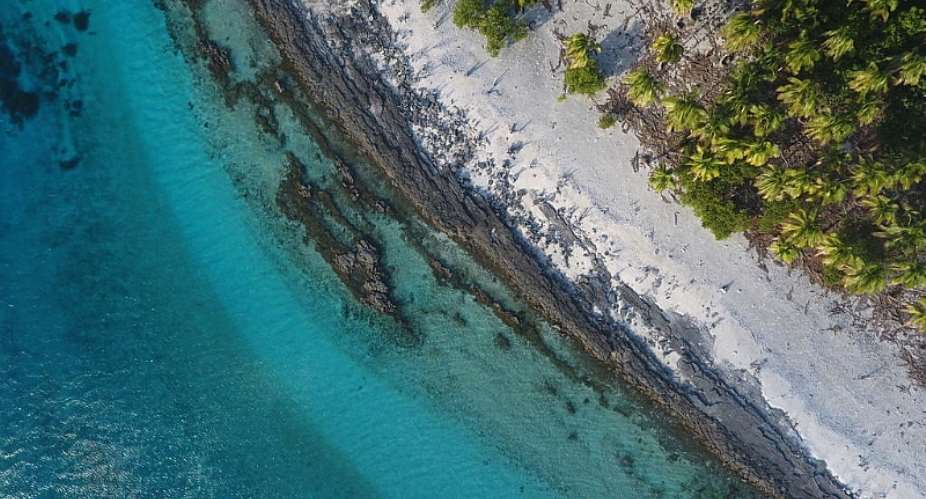A global push to conserve vast swathes of ocean – 18 million square kilometres – over the next five years was launched Tuesday, as the world seeks a landmark deal to protect a third of its oceans by the end of the decade.
Known as the Blue Nature Alliance, the initiative brings together NGOs, governments, scientists and the private sector to ramp up ocean conservation.
In particular, it's honing the skills of indigenous peoples – who have been long excluded from decision-making despite outperforming governments as the most effective custodians of nature.
“What we're trying to do is decolonise the conservation space,” explains Angelo Villagomez of The Pew Charitable Trusts, one of the NGOs behind the alliance.
A native Chamorro of the remote Mariana Islands, Villagomez told RFI that Pacific islanders have a deep-seated tradition of creating what Western scientists would call “protected areas”.
“Most English people know the word 'taboo' – but they may not know it was translated from a Polynesian-Melanesian word meaning 'something sacred',” he says.
“It can be a species or a place – or it can be during a certain time – and it means it's not to be disturbed … and this tradition of taboo exists in nearly every Pacific island.”
Inclusion of Fiji chiefs
The Blue Nature Alliance is involved in large-scale conservation in Fiji, Tristan da Cunha and Antarctica, with further projects planned in Canada, Palau, the Seychelles, the Western Indian Ocean and elsewhere.
Work being done in Fiji, which still has a hereditary system of chiefs who preside over villages, is perhaps the best example of how the alliance is making use of traditional practices and technologies.
“Fiji has a tenure system along their shores called iQoliqoli, and these are inshore fisheries areas that extend from shore to the edge of the fringing reef,” Villagomez explains.
The individual communities who manage the iQoliqoli fishing grounds are helping to establish an widespread conservation area in the Lau Archipelago – Fiji's most remote island group.
The smattering of islands is home to 10,000 people, as well as some 200 species of hard coral and 530 species of reef fish.
“And as the alliance grows, we hope to conduct our work in a similar way as we are in Fiji,” Villagomez says.
Oceans under strain
The world's oceans, which produce more than half of our oxygen and are a food source for at least 3 billion people, are under unprecedented strain.
To ward off the worst effects of climate change, the International Union for Conservation of Nature says at least a 30 percent of the ocean must be off-limits to fishing and mining by 2030.
This target is expected to be adopted at the UN Biodiversity summit taking place in China later this year.
The Blue Nature Alliance is aiming to contribute 5 percent of that effort via its push to conserve 18 million square kilometres of ocean.
“A healthy ocean is key to our existence; it provides nutrition and employment for a majority of people around the world,” says Aulani Wilhelm, an indigenous Hawaiian from the non-profit Conservation International, another NGO behind the alliance.
“We must collaborate globally, in partnership with local governments and indigenous peoples, to make the conservation of our ocean a priority.”





 Chairman Kingsley Owusu Brobbey calls for Privatization of Electricity
Chairman Kingsley Owusu Brobbey calls for Privatization of Electricity
 Train accident: Four more grabbed and remanded
Train accident: Four more grabbed and remanded
 Gov't to consolidate cash waterfall revenue collection accounts
Gov't to consolidate cash waterfall revenue collection accounts
 Gov't to settle lump sum for retired teachers by April 27
Gov't to settle lump sum for retired teachers by April 27
 Former PPA CEO granted GH₵4million bail
Former PPA CEO granted GH₵4million bail
 Dumsor: The darkness has exposed you; you’ll go down as the worst in Ghana’s his...
Dumsor: The darkness has exposed you; you’ll go down as the worst in Ghana’s his...
 Dumsor: The ‘incompetent’ person provided a timetable whiles those who came to s...
Dumsor: The ‘incompetent’ person provided a timetable whiles those who came to s...
 Defend, ensure NPP’s good works are ‘sold’ and highlight the ‘bad’ state of the ...
Defend, ensure NPP’s good works are ‘sold’ and highlight the ‘bad’ state of the ...
 Bawumia will rank high ahead of Mahama in any anti-corruption test — Salam Musta...
Bawumia will rank high ahead of Mahama in any anti-corruption test — Salam Musta...
 NPP trying to bribe us but we‘ll not trade our integrity on the altar of corrupt...
NPP trying to bribe us but we‘ll not trade our integrity on the altar of corrupt...
